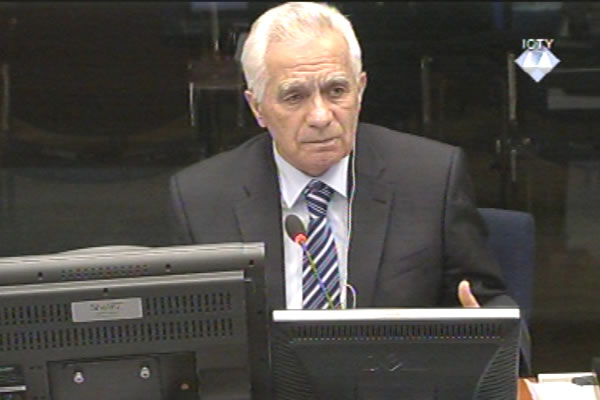Home
KRAJISNIK IS ‘NOT CREDIBLE’ AS WITNESS
On the first day of Momcilo Krajisnik’s cross-examination, the prosecutor reminded the court that Krajisnik had already testified in his own defense at his trial and the judgment concluded he was a witness of ‘very low credibility’. Krajisnik was convicted of various crimes in BH
 Momcilo Krajisnik, witness at the Radovan Karadzic trial
Momcilo Krajisnik, witness at the Radovan Karadzic trial In a bid to contest the credibility of Karadzic’s defense witness Momcilo Krajisnik, prosecutor Alain Tieger reminded the court at the beginning of the cross-examination that Krajisnik was sentenced to 20 years for his involvement in the joint criminal enterprise aimed at ethnically cleansing parts of BH Serbsclaimed belonged to them. The prosecutor recalled that Krajisnik’s testimony in his own defense didn’t help him. On the contrary, the judgment found Krajisnik was witness of ‘a very low credibility’ whose claims didn’t tally with the rest of the evidence.
In his evidence last week in Radovan Karadzic’s defense, Krajisnik tried to present himself, the accused and the entire Republika Srpska leadership as the most moderate group in the whole conflict in BH. The prosecutor reminded Krajisnik that during the war he didn’t hesitate to make radical statements. At a rally in August 1994, Krajisnik spoke about the extremist views expressed by the ARK leaders Radoslav Brdjanin and Vojislav Kupresanin, who called Muslims ‘heathens’ and a nation that ‘doesn’t exist’. Krajisnik said these were ‘beautiful speeches’. The witness replied that he didn’t really think they were beautiful, but a rally with a large number of people in attendance wasn’t a ‘place for polemic’. Confronted with the fact that he said in a speech in the Assembly that ‘Muslims are not a nation’, Krajisnik explained that he said it to keep the radical deputies happy, so that the session could continue. In the same speech, Krajisnik referred to Muslims as ‘Turks’. At his own trial, as the prosecutor recalled today, Krajisnik distanced himself from ‘that Momcilo Krajisnik’ and called ‘his’ statement ‘pointless’.
The prosecutor refuted Krajisnik’s claim that the Bosnian Serb political leadership headed by the accused Karadzic dealt with civilian issues only. Krajisnik claimed that the army set the combat objectives and implemented them independently. The witness admitted that he and Karadzic wrote a document called the Six strategic goals. The document defined the territory that was to be held by the Bosnian Serbs: Posavina, Podrinje, a part of Sarajevo, access to the sea, boundaries on the Neretva and Una rivers, and no border on the Drina river. Krajisnik argued that those were political goals. The army was not ordered to comply with them.
The prosecution also has a series of military documents, entries from Ratko Mladic’s diary and minutes from the meetings of the Bosnian Serb presidency. The documents all show the timeline of the events: the directives, as highest-level military documents, were issued immediately after the meetings of military and civil leadership. Suggestions made by Karadzic, Krajisnik and other civilian officials about the ways in which the army should plan its operations to implement the strategic goals were copied more or less verbatim in the directives. The witness didn’t deny that they discussed the goals at the meetings but still felt that the military put them into the directives on its own initiative.
It was interesting to hear Krajisnik’s comment about Directive 4 from November 1992, which states that the enemy should be forced together with the ‘Muslim population to leave the Birac, Zepa and Gorazde area’. When he testified in his own defense in 2006, Krajisnik said it was a ‘punishable’ order ‘to carry out ethnic cleansing’. Today, Krajisnik had a different explanation. In the meantime, he had spoken to the man who wrote the directive – General Radivoje Miletic – when they were in the Detention Unit in The Hague together. Miletic ‘wondered himself how such an error could end up’ in the text, Krajisnik said today. The prosecutor remarked that there was very little to wonder at there, and tendered into evidence the minutes from a meeting of the military and political leadership held about ten days before the directive was issued. At the meeting, Krajisnik says, ‘Muslims must not stay with us’ and calls for the ‘cleansing of the Drina area and the separation of ethnic communities’.
Momcilo Krajisnik’s cross-examination continues tomorrow.
Linked Reports
- Case : Karadzic
- 2013-11-18 BRDJANIN SORRY HE COULD NOT BE TRIED ON ‘NEW STANDARDS’
- 2013-11-15 WAS KARADZIC ‘AGGRESSIVE’ OR ‘VIOLENT’?
- 2013-11-14 WHY DID KARADZIC TOLERATE BRDJANIN’S ‘IDIOTIC’ ACTIONS?
- 2013-11-20 MILOSEVIC’S ‘NASTY WORDS’ ABOUT KARADZIC AND KRAJISNIK
- 2013-11-21 KARADZIC AND KRAJISNIK FOR EU IN BALKANS
- 2013-11-26 KARADZIC DISTANCES HIMSELF FROM CRIMES IN KRAJINA
